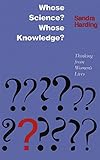Whose Science? Whose Knowledge? : Thinking from Women's Lives / Sandra Harding.
Material type: TextPublisher: Ithaca, NY : Cornell University Press, [2016]Copyright date: ©2016Description: 1 online resource (336 p.)Content type:
TextPublisher: Ithaca, NY : Cornell University Press, [2016]Copyright date: ©2016Description: 1 online resource (336 p.)Content type: - 9781501712951
- Feminist theory
- Knowledge, Theory of
- Science -- Social aspects
- Science
- Women in science
- Women -- Employment
- Working class women
- History Of Science
- History
- Womens Studies
- SOCIAL SCIENCE / Feminism & Feminist Theory
- Epistemology philosophy
- Epistemology
- Feminisms
- Feminist Epistemology
- Feminist activism
- Feminist analysis
- Feminist discourse
- Feminist education
- Feminist literature
- Gender & Society
- Social Research
- The Science Question in Feminism
- Women's Studies
- epistemology
- feminism and methodology
- feminism and science
- feminism and society
- feminism
- feminist approach to science
- feminist critique
- feminist knowledge theory
- feminist perspective
- feminist science studies scholar
- feminist sociology
- feminist studies
- feminist theory
- gender studies
- history of philosophy
- intro to feminism
- introduction to feminism
- knowledge
- male feminist
- modernity studies
- philosophical feminist theories
- philosophy of science
- philosophy
- science theory
- scientific knowledge
- sociology
- theory
- understanding feminism
- women in science
- 305.43/5 20
- Q130 .H37 1991
- online - DeGruyter
| Item type | Current library | Call number | URL | Status | Notes | Barcode | |
|---|---|---|---|---|---|---|---|
 eBook
eBook
|
Biblioteca "Angelicum" Pont. Univ. S.Tommaso d'Aquino Nuvola online | online - DeGruyter (Browse shelf(Opens below)) | Online access | Not for loan (Accesso limitato) | Accesso per gli utenti autorizzati / Access for authorized users | (dgr)9781501712951 |
Browsing Biblioteca "Angelicum" Pont. Univ. S.Tommaso d'Aquino shelves, Shelving location: Nuvola online Close shelf browser (Hides shelf browser)

|

|

|

|

|

|

|
||
| online - DeGruyter Heading Out : A History of American Camping / | online - DeGruyter The Supreme Court and Constitutional Democracy / | online - DeGruyter Whistleblowers : Broken Lives and Organizational Power / | online - DeGruyter Whose Science? Whose Knowledge? : Thinking from Women's Lives / | online - DeGruyter Radical Democracy / | online - DeGruyter Empire of Conspiracy : The Culture of Paranoia in Postwar America / | online - DeGruyter Material Beings / |
Frontmatter -- Contents -- Preface -- I. Introduction: After the Science Question in Feminism -- I. Science -- 2. Feminism Confronts the Sciences: Reform and Transformation -- 3. How the Women's Movement Benefits Science: Two Views -- 4. Why "Physics" Is a Bad Model for Physics -- II. Epistemology -- 5. What Is Feminist Epistemology? -- 6. "Strong Objectivity" and Socially Situated Knowledge -- 7. Feminist Epistemology in and after the Enlightenment -- III. "Others" -- 8. ". . . and Race"? Toward the Science Question in Global Feminisms -- 9. Common Histories, Common Destinies: Science in the First and Third Worlds -- 10. Thinking from the Perspective of Lesbian Lives -- 11. Reinventing Ourselves as Other: More New Agents of History and Knowledge -- 12. Conclusion: What Is Feminist Science? -- Index
restricted access online access with authorization star
http://purl.org/coar/access_right/c_16ec
Sandra Harding here develops further the themes first addressed in her widely influential book, The Science Question in Feminism, and conducts a compelling analysis of feminist theories on the philosophical problem of how we know what we know.Following a strong narrative line, Harding sets out her arguments in highly readable prose. In Part 1, she discusses issues that will interest anyone concerned with the social bases of scientific knowledge. In Part 2, she modifies some of her views and then pursues the many issues raised by the feminist position which holds that women's social experience provides a unique vantage point for discovering masculine bias and and questioning conventional claims about nature and social life. In Part 3, Harding looks at the insights that people of color, male feminists, lesbians, and others can bring to these controversies, and concludes by outlining a feminist approach to science in which these insights are central. "Women and men cannot understand or explain the world we live in or the real choices we have," she writes, "as long as the sciences describe and explain the world primarily from the perspectives of the lives of the dominant groups."Harding's is a richly informed, radical voice that boldly confronts issues of crucial importance to the future of many academic disciplines. Her book will amply reward readers looking to achieve a more fruitful understanding of the relations between feminism, science, and social life.
Mode of access: Internet via World Wide Web.
In English.
Description based on online resource; title from PDF title page (publisher's Web site, viewed 26. Apr 2024)


